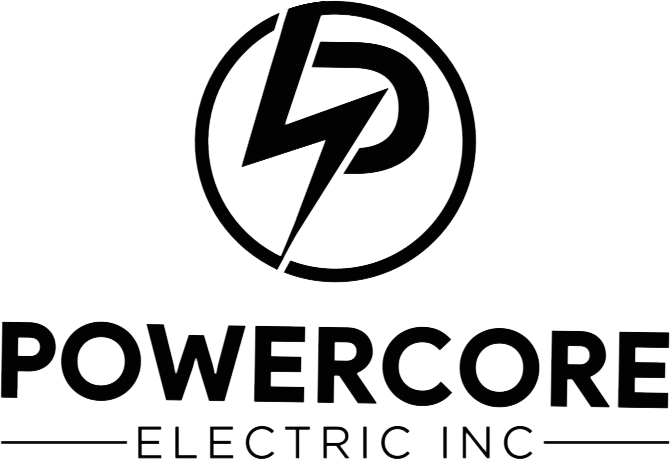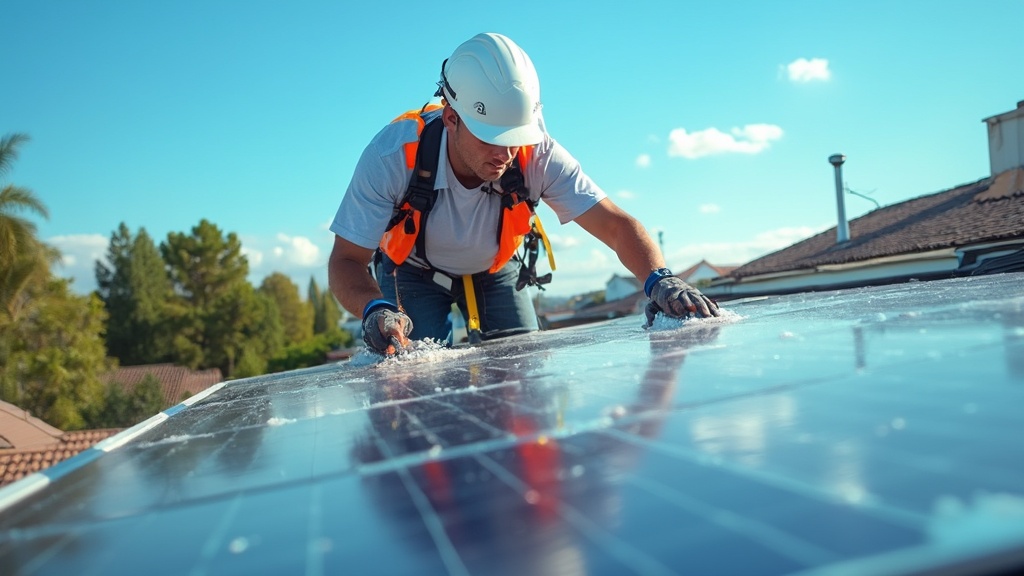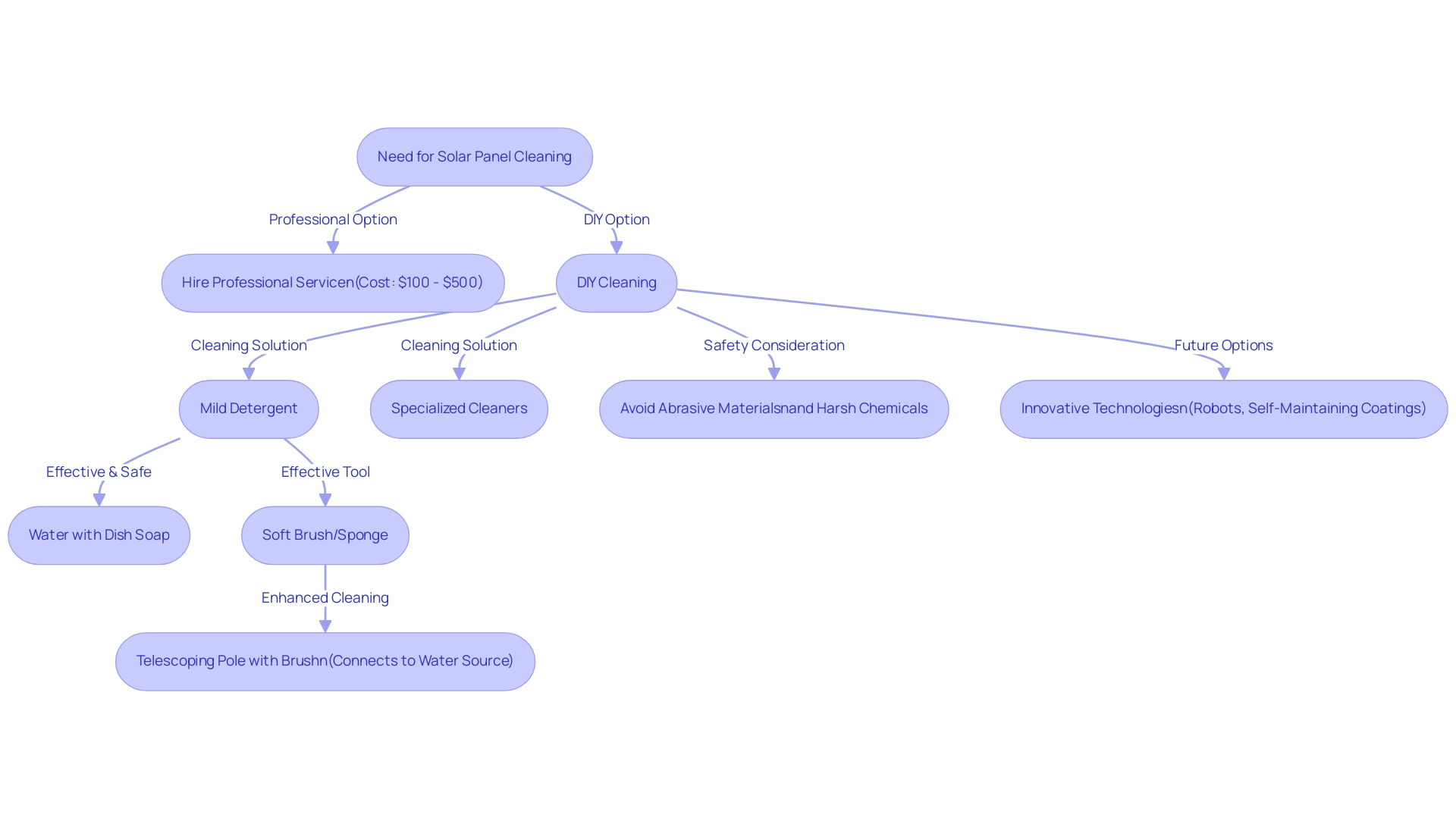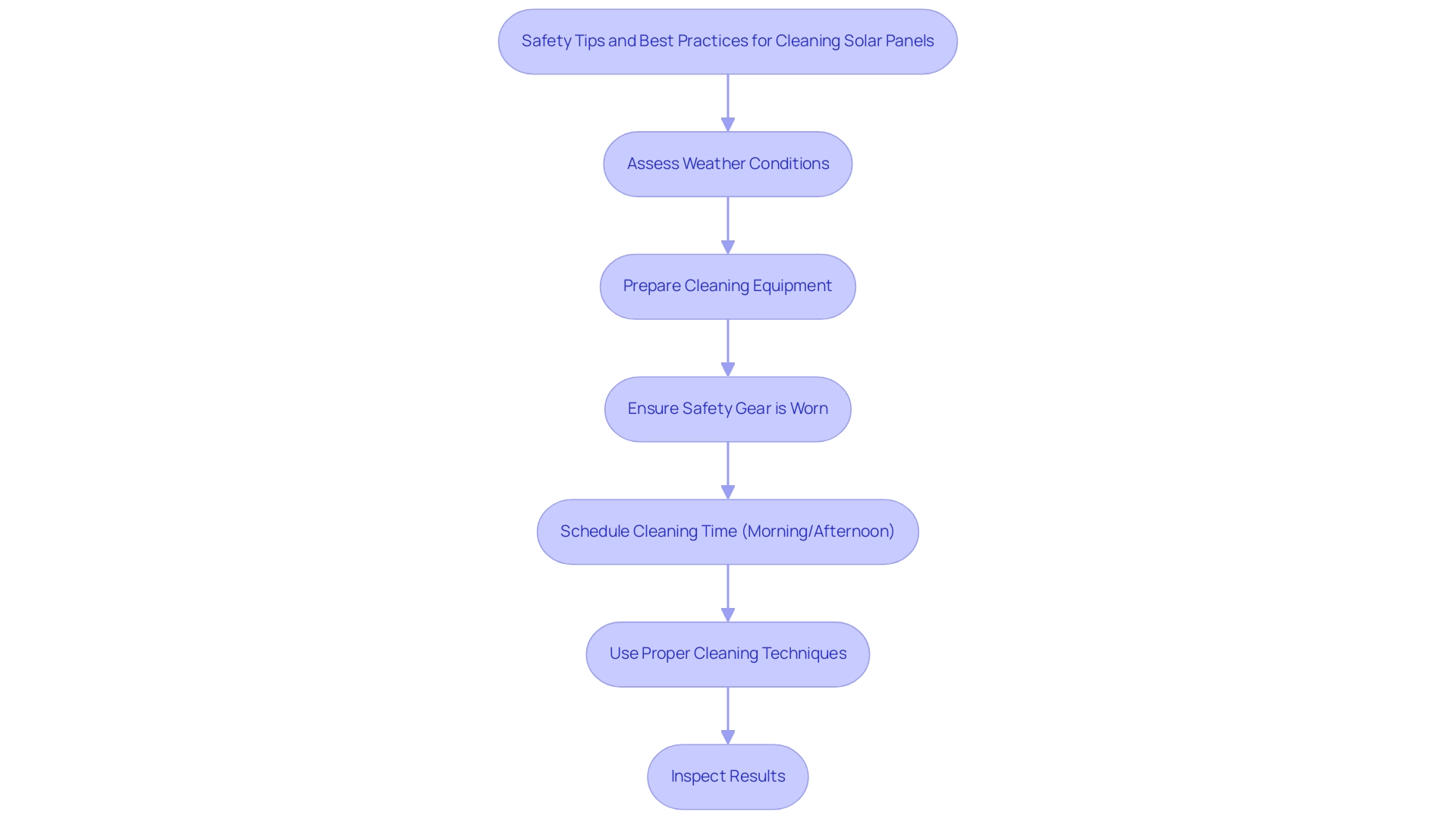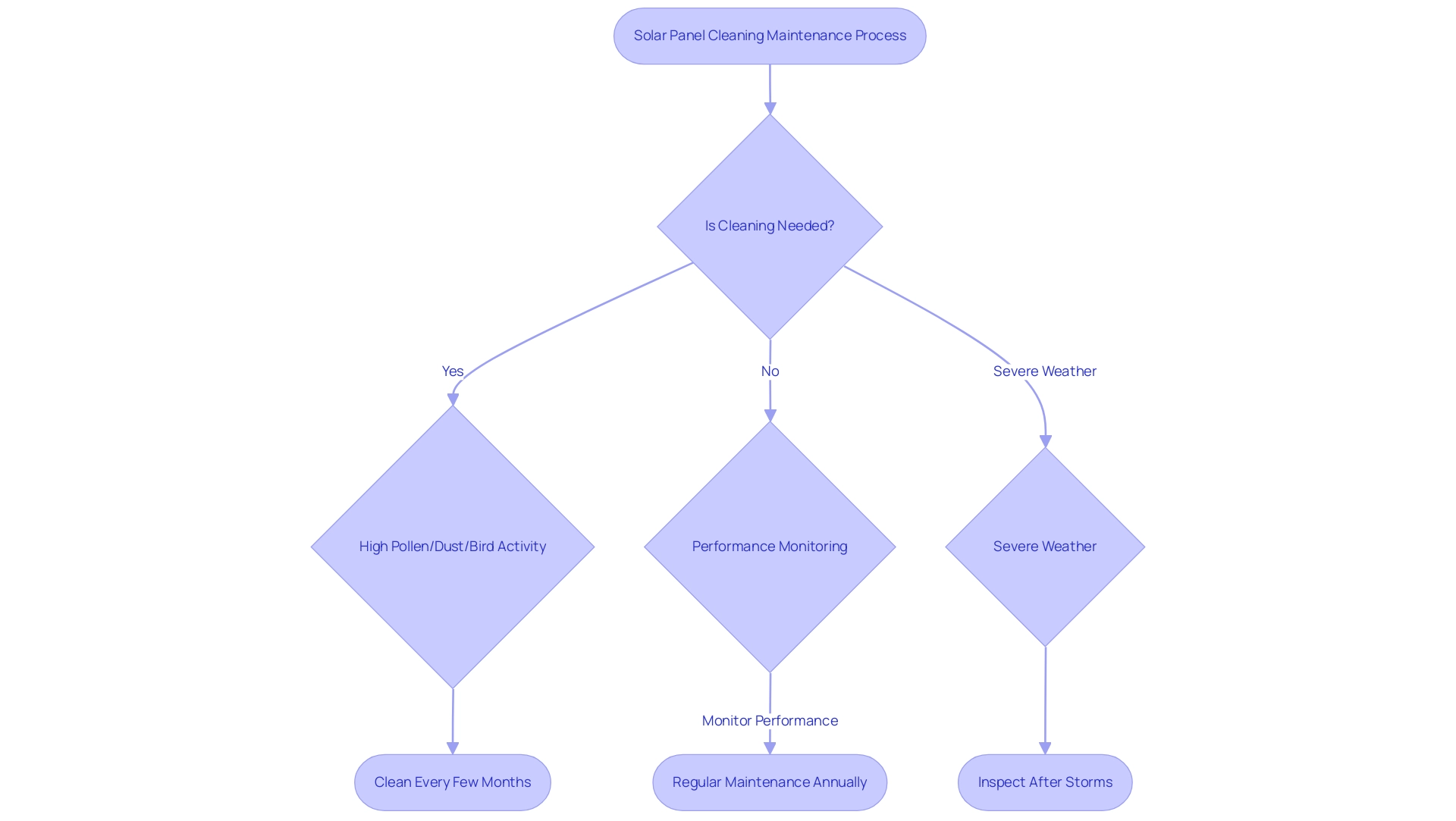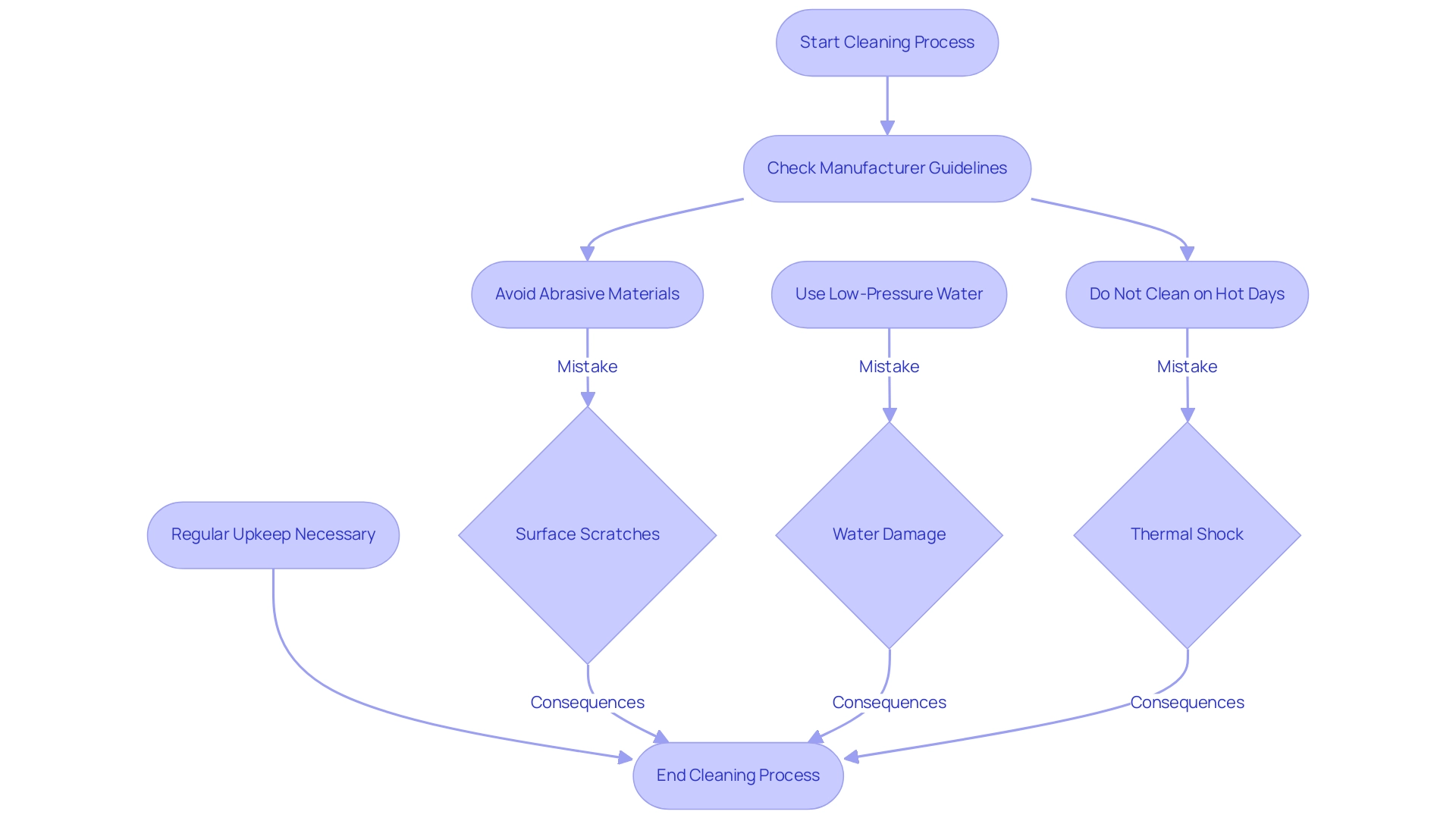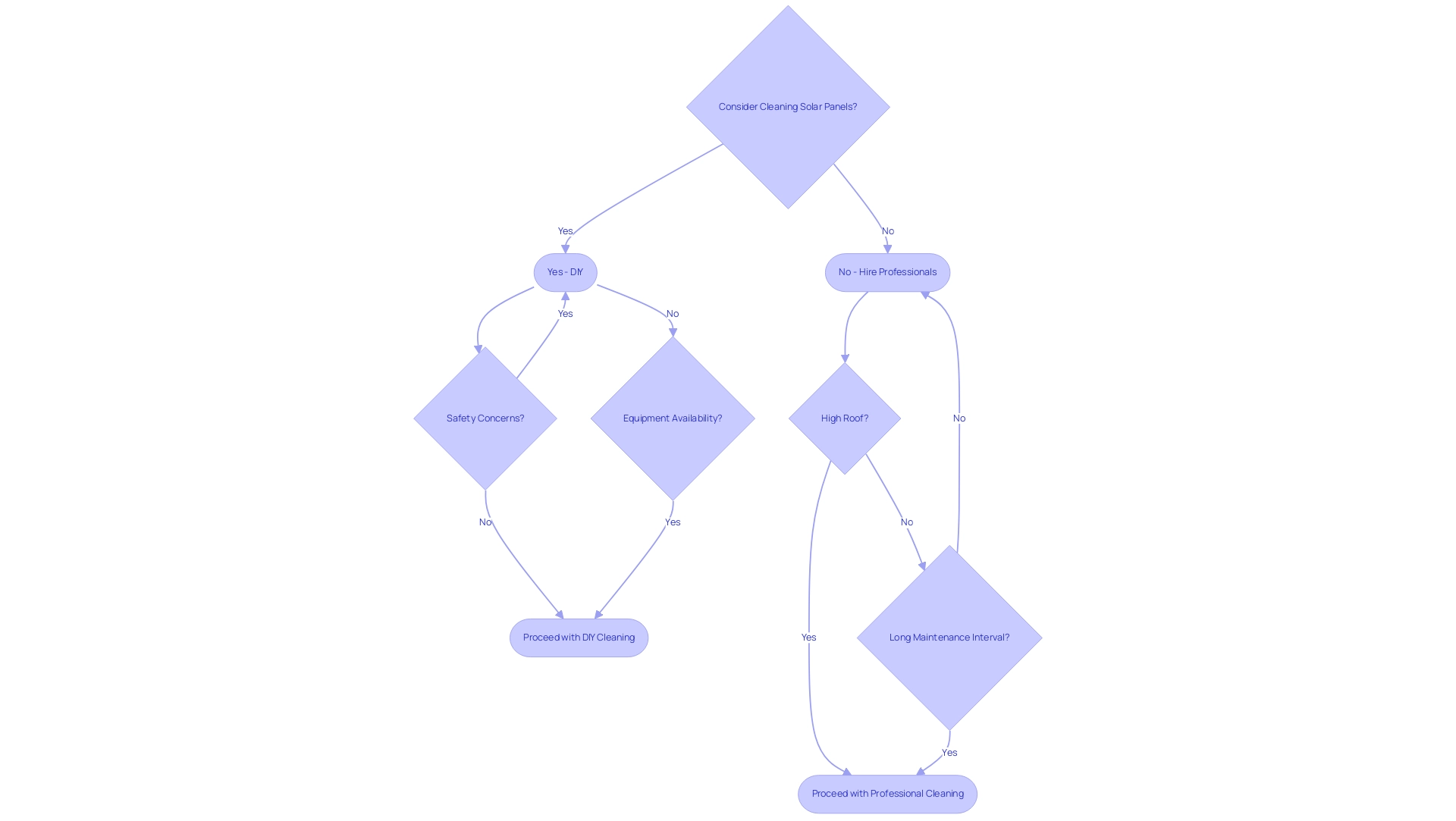Overview
The article addresses what can be used to clean solar panels, emphasizing the importance of using mild detergents or specialized cleaners to ensure effective and safe maintenance. It supports this by highlighting that a simple mixture of water and dish soap, along with soft brushes, is recommended to avoid damage, while also discussing the benefits of professional cleaning services and innovative technologies for maintaining optimal solar panel efficiency.
Introduction
Keeping solar panels clean is essential for maximizing their efficiency and ensuring a solid return on investment. As homeowners increasingly embrace renewable energy, understanding the best practices for maintaining solar panels becomes critical. From selecting the right cleaning solutions to knowing when to call in the professionals, this guide offers valuable insights into the dos and don’ts of solar panel maintenance.
With the potential for significant savings on electric bills and the added benefit of contributing to a cleaner environment, homeowners can feel empowered to take charge of their solar panel care. Whether it’s tackling dirt buildup or avoiding common cleaning mistakes, the right approach can lead to optimal performance and longevity of this vital energy source.
Choosing the Right Cleaning Solutions for Solar Panels
Cleaning your energy collectors is more than just a task—it’s a crucial step in ensuring they function effectively and save you money over time. With the expense of employing a professional service for maintaining your systems usually varying from $100 to $500, it’s advisable to evaluate your choices for ensuring your units remain in optimal condition. Top-rated services like Sunshine Cleaners, Solar Shine, and Eco-Solar Clean offer tailored packages that emphasize eco-friendly practices.
When selecting cleaning solutions, one might wonder what can I use to clean my solar panels, making it essential to choose mild detergents or specialized cleaners for energy systems that are designed to be both effective and safe. As electrical engineer Carlos Huerta observes, ‘Rave reviews from customers indicate that this is the finest cleaner for energy systems available.’ It’s important to steer clear of abrasive materials and harsh chemicals, as these can scratch the glass or damage your panels’ surfaces.
Instead, a simple mixture of water with a few drops of dish soap is what I can use to clean my solar panels, and it can work wonders. For the actual maintenance, when considering what can I use to clean my solar panels, using a soft brush or sponge allows you to gently scrub away dirt and grime without risking harm to your solar investment. Additionally, tools like a telescoping pole with a brush that connects to a water source can improve your washing effectiveness.
Innovative technologies such as automated robots for sanitation and self-maintaining coatings are also emerging, which can further simplify upkeep and enhance efficiency. Remember, maintaining the integrity of your components is crucial. A good maintenance routine can lead to consistent power generation, ultimately resulting in greater savings over time.
Investing in proper cleaning systems not only enhances the efficiency of your energy collectors but also contributes to a cleaner environment, echoing the benefits highlighted in recent insights about professional cleaning services and innovative technologies in the renewable energy sector.
Safety Tips and Best Practices for Cleaning Solar Panels
To maintain the efficiency of photovoltaic surfaces, especially in industrial zones where dust accumulates, it’s important to know what can I use to clean my solar panels. This maintenance is not solely focused on performance; with the average electric bill being $290 monthly, ensuring your energy systems function at optimal efficiency can result in considerable savings over time. Different maintenance services are offered that focus on solar array upkeep, including guidance on what can I use to clean my solar panels to guarantee optimal performance.
Employing experts can save you time and guarantee that the task is completed safely and efficiently, especially when you ask what can I use to clean my solar panels using the latest innovative sanitation technologies that enhance the process. Prioritizing your safety during this maintenance process is essential—always use a sturdy ladder when accessing surfaces on your roof, wear non-slip shoes to enhance your grip, and consider using a harness for added security, particularly when working at heights. It’s best to avoid tidying up during severe weather conditions; high winds or rain can lead to accidents that are easily preventable.
For optimal results, aim to clean your surfaces early in the morning or late in the afternoon to minimize the risk of water evaporating too quickly and leaving unsightly streaks. As Ahmed Rachid emphasizes in his study on sunlight collection surface maintenance systems and methods, adhering to these optimal practices not only guarantees your safety but also enhances the efficiency of your surface maintenance endeavors, enabling you to utilize the complete advantages of your sunlight solution.
How Often Should You Clean Your Solar Panels?
For optimal performance of your solar devices, it is essential to maintain cleanliness, leading many eco-conscious homeowners to wonder, what can I use to clean my solar panels to maximize their investments in renewable energy. The frequency of sanitation can depend on various factors like your location and surrounding environment. Specialists typically advise maintaining your surfaces a minimum of two times annually.
However, if you reside in areas with high levels of pollen, dust, or frequent bird activity, you might wonder what can I use to clean my solar panels every few months to keep them effective. As one expert noted,
Localized soiling of solar surfaces is when material like bird droppings, leaves, and any other heavy blockages get stuck on your devices, but only cover part of the surface.
This type of debris can significantly affect your system’s efficiency.
The surrounding environment, including closeness to trees or birds, can require regular maintenance to eliminate debris and organic matter. After severe weather events, such as storms or heavy rains, it’s wise to inspect your panels and determine what can I use to clean my solar panels if necessary. Research indicates that a study showed a 7.4% drop in energy generation efficiency after 145 days without upkeep, underscoring the importance of regular maintenance.
Monitoring your system’s performance can assist you in deciding if maintenance is required sooner rather than later, ensuring that your investment keeps generating the savings you anticipate. Routine expert maintenance at least once a year, as advised by specialists, can assist in preserving the integrity and efficiency of your systems, especially in difficult conditions, much like asking what can I use to clean my solar panels. Given that your electric bill is $290 per month, maintaining optimal efficiency through regular cleaning can lead to significant savings over time.
Moreover, incorporating solutions such as Tesla home chargers can improve your savings, as they function smoothly with photovoltaic systems to power your electric vehicle using renewable resources. Moreover, investigating government initiatives that promote renewable resource adoption can offer financial benefits for homeowners. Lastly, considering leading cleaning services for your energy collectors can provide expert support to ensure your systems are consistently functioning at their peak, optimizing the advantages of your renewable energy investment.
Avoiding Common Mistakes When Cleaning Solar Panels
While cleaning solar surfaces may seem straightforward, knowing what can I use to clean my solar panels is important, as several common mistakes can lead to significant damage and decreased efficiency. One prevalent error is the use of abrasive materials like steel wool or rough sponges, which can easily scratch the delicate surface of the surfaces, resulting in permanent damage. Additionally, using high-pressure water during the process can dislodge crucial connections or harm seals, potentially causing leaks that compromise your system’s integrity.
It’s also crucial to refrain from washing surfaces when they’re hot; this can cause thermal shock, resulting in cracks in the glass. To ensure that you maintain your warranty, be sure to follow the manufacturer’s cleaning guidelines, which typically answer the question of what can I use to clean my solar panels by recommending soft brushes or cloths and low-pressure water. As Mohamed M. El-Haddad wisely states, ‘When considering what can I use to clean my solar panels, using inappropriate tools or methods can lead to several problems, including surface scratches, water damage, and chemical corrosion.’
Moreover, ignoring regular upkeep can lead to dust, dirt, and debris accumulation, prompting the question of what can I use to clean my solar panels, as this accumulation obstructs power generation. In fact, the median loss rate for photovoltaic system performance is 0.75% per year, emphasizing the significance of keeping your solar panels clean for optimal power generation. As one expert noted, ‘Did you notice a significant drop in energy production?
This issue can be due to a variety of factors, with the most common being dust and debris buildup.’ It’s critical to recognize the risks associated with DIY cleaning without proper training, as safety protocols are crucial, especially in hard-to-reach areas. Furthermore, environmental elements like particulate matter concentration and tilt angle can affect the efficiency of your photovoltaic systems.
Keeping these tips in mind will help maintain your energy collectors in optimal condition, ensuring they generate electricity efficiently and effectively while contributing to a more sustainable and environmentally friendly home.
When to Consider Professional Solar Panel Cleaning Services
Cleaning your solar devices can often be a fulfilling DIY project, but there are certainly situations where bringing in the pros makes a lot of sense. For example, if your structures are perched high on a steep roof or if heights make you uneasy, it’s wise to seek professional help. Safety should always come first, and you’ll want to avoid any unnecessary risks.
Moreover, if your surfaces seem to be covered in grime and haven’t undergone maintenance in a long time, experts arrive with specialized equipment to bring them back to their sparkling best without any difficulty. Another persuasive reason to think about employing specialists is if you’re uncertain about what can I use to clean my solar panels, including methods or products like using a soft brush or environmentally friendly solutions specifically designed for photovoltaic panels. A professional service not only offers peace of mind but also ensures your energy investment receives the proper care it deserves, maximizing its performance and longevity.
Remember, the long-term effects of soiling can significantly impact your system’s efficiency over time, making professional maintenance essential. With the photovoltaic module servicing market anticipated to expand at a CAGR of 9.06% from 2025 to 2033, the need for professional services is undoubtedly increasing. However, it’s important for homeowners to weigh the financial implications; the high costs associated with renewable energy system cleaning, including equipment upkeep that averages between USD 5,000 to USD 10,000 annually, could influence your decision on whether to hire professionals or tackle the job yourself.
Moreover, as you evaluate energy alternatives such as Tesla home chargers and government initiatives that promote renewable adoption, ensuring your systems are clean and efficient is essential. This comprehensive approach to solar panel care ensures that you’re making informed choices that benefit both your home and the environment.
Conclusion
Keeping solar panels clean is a vital practice that significantly impacts their efficiency and longevity. By selecting the right cleaning solutions and employing safe techniques, homeowners can maximize their investment in renewable energy. Utilizing mild detergents and soft brushes ensures that the panels are cleaned without risking damage, while innovative technologies like self-cleaning coatings and automated robots can further enhance maintenance efforts.
Regular cleaning is crucial, particularly in environments with high dust or debris accumulation. Experts recommend cleaning at least twice a year, with more frequent attention necessary in challenging conditions. This proactive approach not only helps maintain optimal energy production but can also lead to considerable savings on electric bills.
Avoiding common mistakes, such as using abrasive materials or cleaning during peak heat, is essential for preserving the integrity of solar panels. When in doubt, or for hard-to-reach installations, professional cleaning services provide a safe and effective alternative that can help ensure panels continue to perform at their best.
Ultimately, understanding the importance of routine maintenance and the best practices surrounding it empowers homeowners to take charge of their solar energy systems. By committing to regular cleaning and care, the benefits of solar energy can be fully realized, contributing to both personal savings and a healthier environment.
